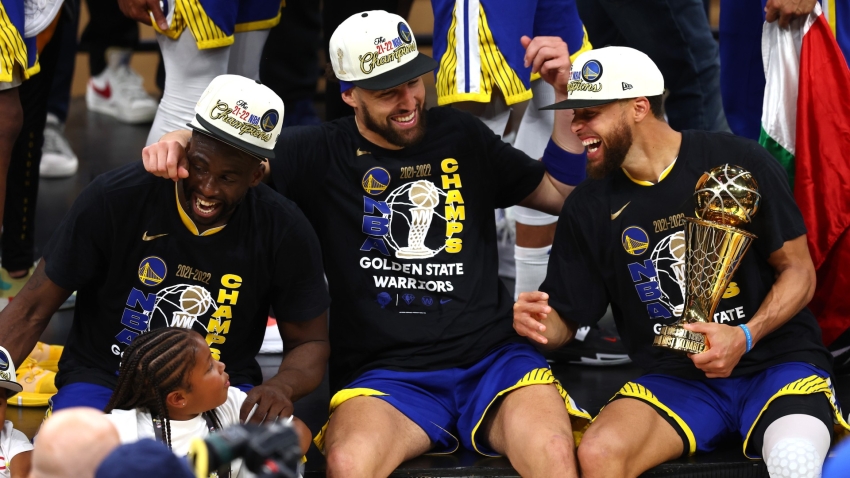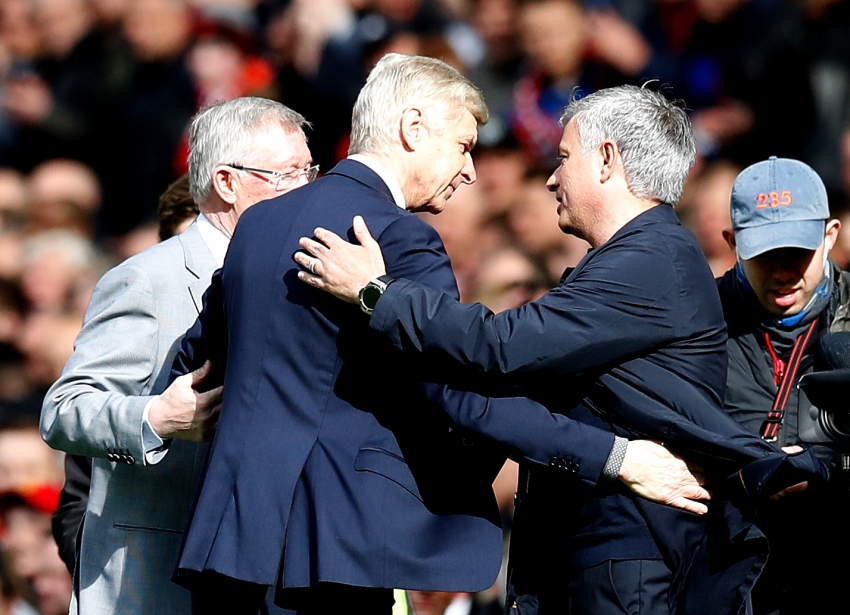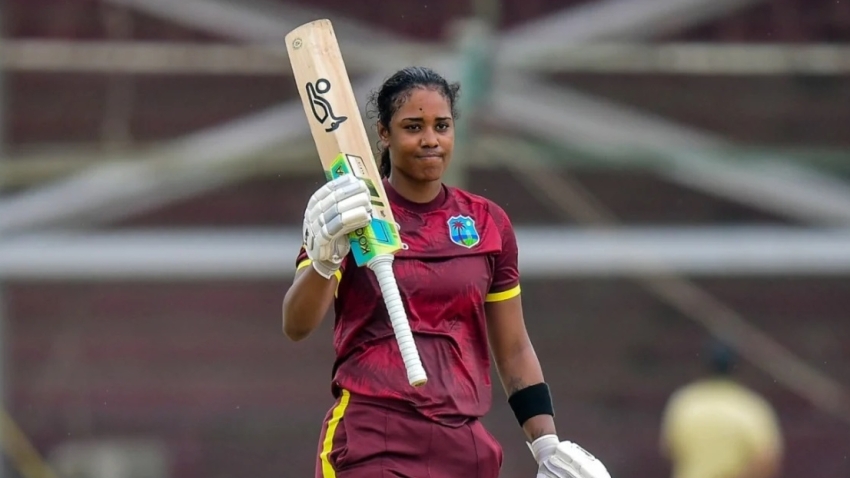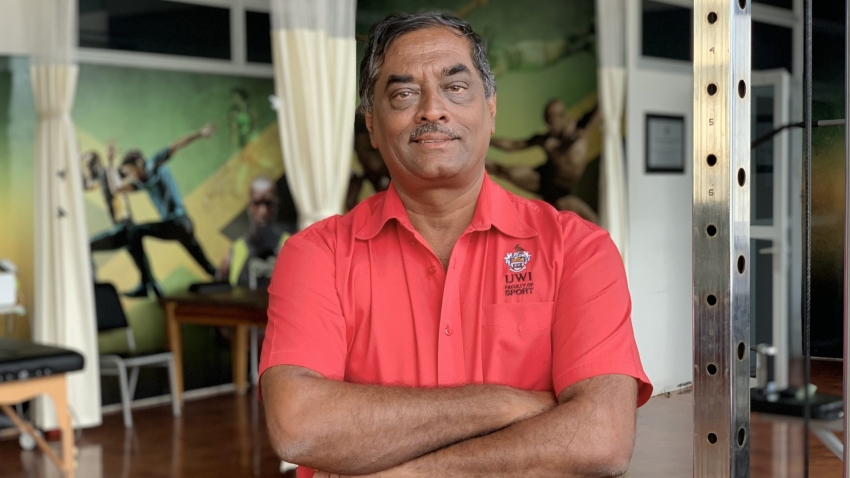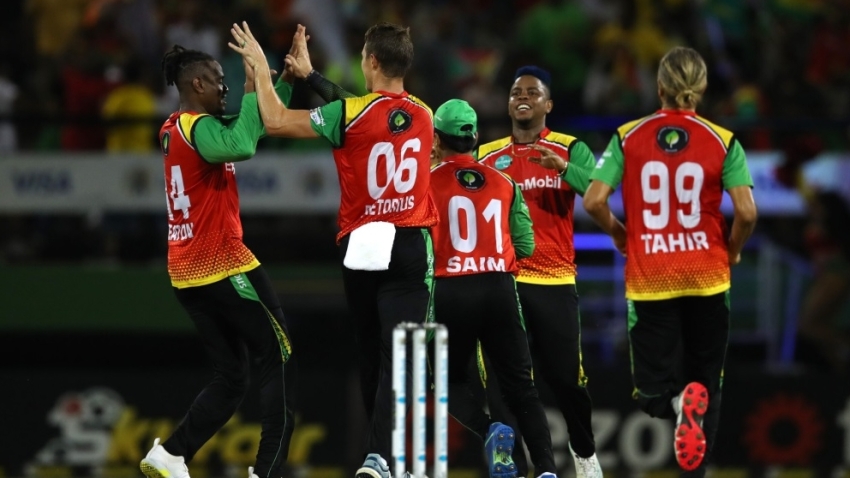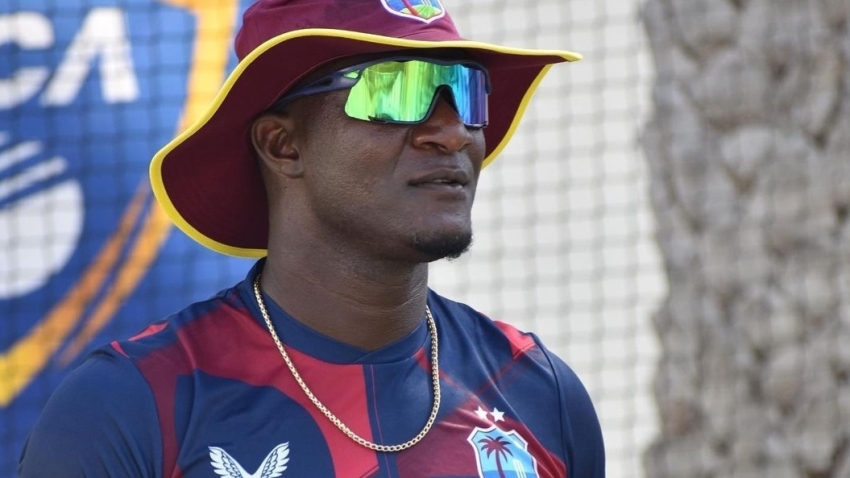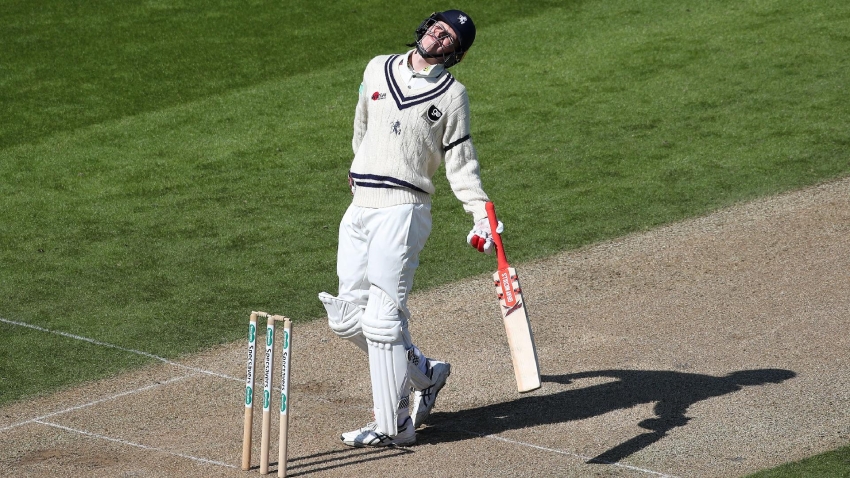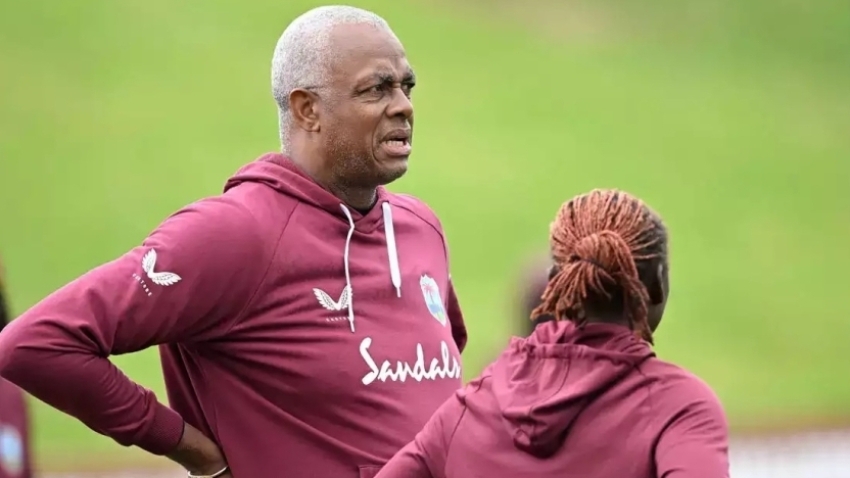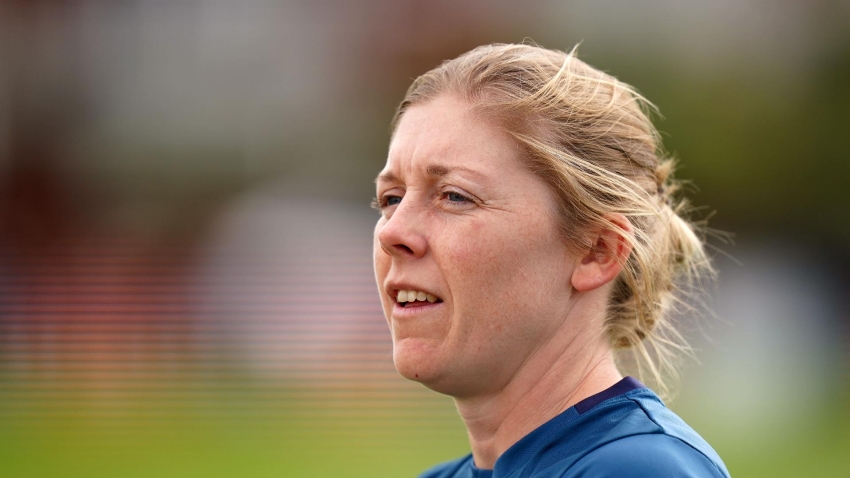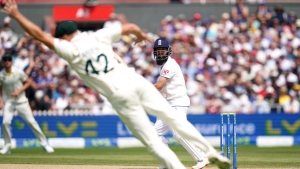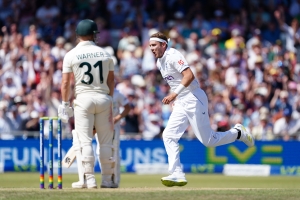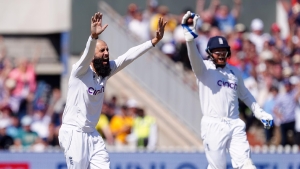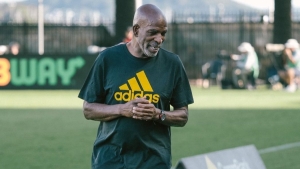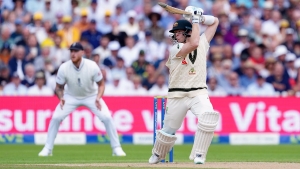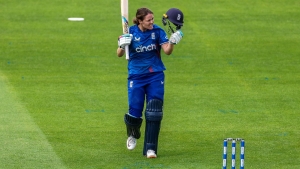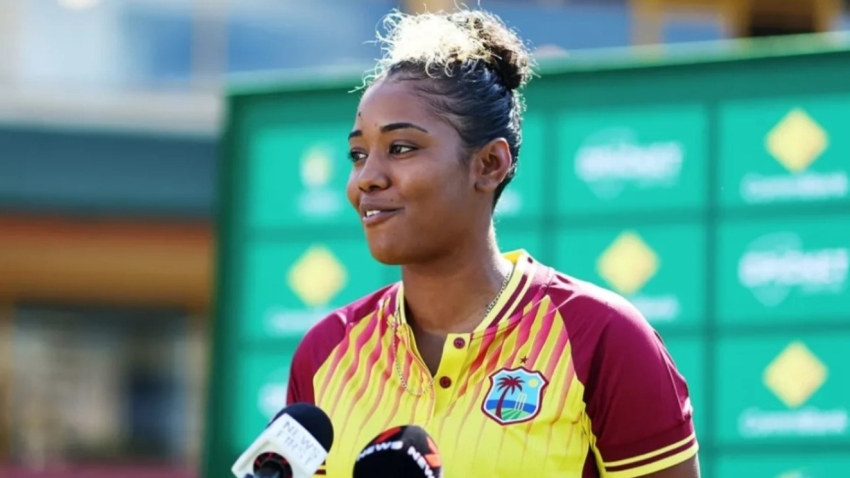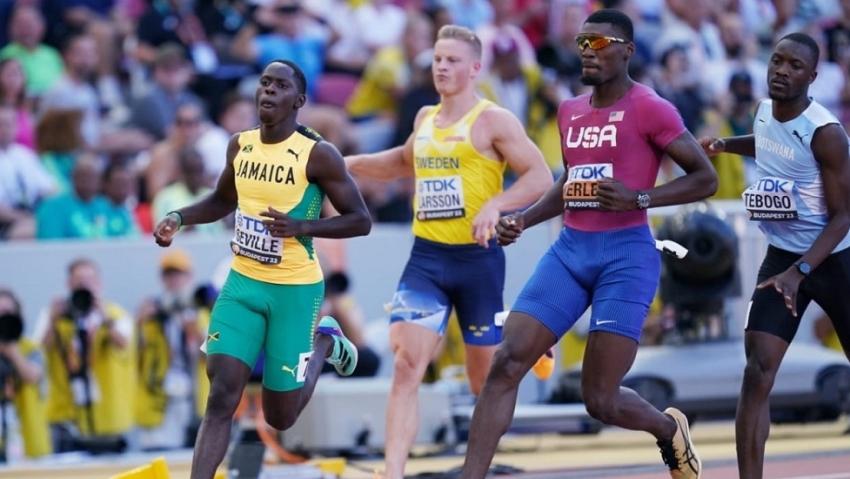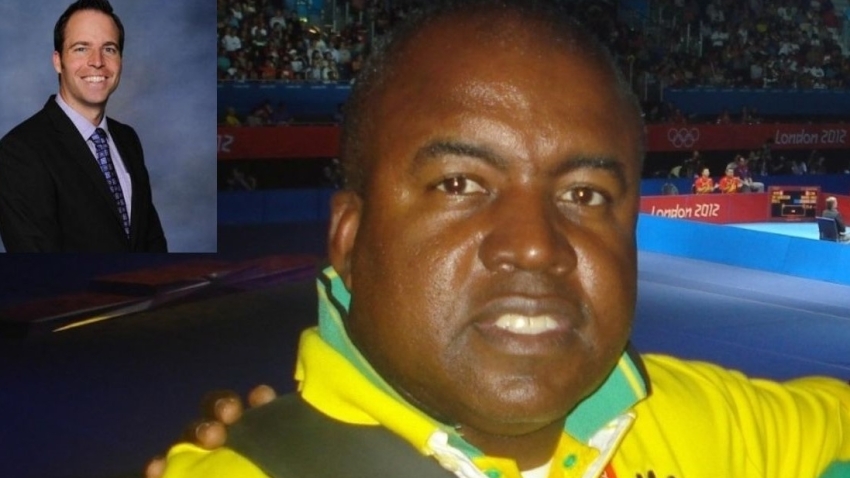Moeen Ali reached the Test all-rounder’s benchmark of 3,000 runs and 200 wickets as he batted against Australia at Old Trafford.
The England spinner, promoted to number three in the batting order for the fourth Ashes Test, flashed a Pat Cummins delivery wide of gully to reach 24 for his innings and exactly 3,000 runs in the format before immediately celebrating with a more authentic boundary through the covers.
He is the 16th player and the fourth Englishman to reach both landmarks and, here, the PA news agency looks at that select group.
Awesome foursome
Moeen brought up 200 wickets with the scalp of Steve Smith in Australia’s second innings of the third Test at Headingley.
With Ollie Pope out injured, he put his hand up to bat at three in England’s chase in Leeds and would have had hopes of making the 28 runs he needed to tick off both marks in one match.
Just five were forthcoming but he took his opportunity on the second morning in Manchester.
Moeen’s five centuries include a best of 155 not out against Sri Lanka in 2016 while he also has five five-wicket hauls, his best figures being six for 53 against South Africa in 2017.
He joins team-mate Stuart Broad and past greats Sir Ian Botham and Andrew Flintoff, in the 3,000/200 club.
Broad had his own moment in the spotlight on day one of the fourth Test with his 600th wicket, just the fifth man ever to achieve that feat, which he paired with his 3,640 runs at 18.10 in his 165 Tests prior to this, with a best of 169 against Pakistan at Lord’s in 2010.
Botham amassed 5,200 runs at 33.54, with 14 centuries and a best of 208, adding 383 wickets at 28.40 to stake a firm claim as statistically England’s greatest all-rounder – he is also the only one of the quartet to have a higher average batting than bowling.
Flintoff reached 3,845 runs and 226 wickets, in only 79 Tests compared to Botham’s 102. Moeen has taken 67 games to reach 3,000 and 200.
Captain Ben Stokes has over 6,000 runs under his belt and could add his name to the list this series, if his troublesome knee allows him to add the three wickets he still needs.
Sweet 16
England have more representatives than any other nation in the group of elite all-rounders, after Moeen broke the previous tie with New Zealand.
The Black Caps have three names on the list in Sir Richard Hadlee, Chris Cairns and Daniel Vettori.
South Africa and India have two apiece – Shaun Pollock and Jacques Kallis for the former and Kapil Dev and Ravichandran Ashwin for the latter, with five other countries having one each.
West Indies great Sir Garry Sobers was the first to achieve the feat, with Imran Khan following as Pakistan’s only representative – Wasim Akram came up 102 runs short.
Australia spinner Shane Warne, Sri Lanka seamer Chaminda Vaas and Bangladesh’s former captain Shakib al Hasan complete the list.
Kallis has by far the most runs of the 16 players with 13,289, over 5,000 clear of Sobers (8,032) with Dev and Botham the only others over 5,000.
Warne, with 708, comfortably tops Broad as the leading wicket-taker with Ashwin next on 486.
Steph Catley ensured co-hosts Australia opened their World Cup campaign with a 1-0 victory over the Republic of Ireland despite the absence of star striker Sam Kerr.
Catley’s second-half penalty was enough to clinch three points for the Matildas in front of a record crowd of 75,784 at Stadium Australia in Sydney.
However, they had to do it the hard way after their record goalscorer Kerr was ruled out of the first two Group B games with a calf injury suffered in training.
Vera Pauw’s side, making their debut at a major tournament, made life difficult throughout for a side ranked 10th by FIFA, 12 places above Ireland.
But despite a late flurry, they were unable to get themselves back on level terms and will now turn their attention to next Wednesday’s clash with Canada in Perth.
For Australia, there was relief after three hard-earned points were banked to match the feat of co-hosts New Zealand, who had earlier stunned Group A rivals Norway with a 1-0 victory in Auckland, ahead of their second fixture against Nigeria next Thursday.
England made an encouraging start with bat and ball as they attempted to take control of their must-win Ashes Test at Emirates Old Trafford.
The hosts snapped up Australia’s last two wickets as the tourists bowed out for 317, and recovered well from the early loss of Ben Duckett to reach 61 for one at lunch.
Moeen Ali’s experimental promotion to number three was beginning to pay off, with the all-rounder reeling off five boundaries on his way to 31 not out and Zak Crawley was unbeaten on 26.
The growing sense that the game was unfolding in England’s favour was strengthened when Cameron Green had Crawley lbw, only for ball-tracking to show the ball disappearing past the leg stump.
With plenty of rain forecast over the weekend, the home side know they must move fast to set the game up and land the victory they need to keep the series alive, but after four sessions the building blocks are in place.
They enjoyed the perfect start, hometown hero James Anderson striking with the first ball of the day following 17 wicketless overs on Wednesday.
It was far from his best delivery, served up a fraction full outside off stump, but it got the desired response as Pat Cummins lifted a gentle catch straight to Ben Stokes at point to make it 299 for nine.
Anderson, bowling from the end that bears his name, took the acclaim in what could yet be his last appearance at this ground.
England looked to have wrapped things up in the next over, number 11 Josh Hazlewood fencing Chris Woakes to slip, but the TV umpire called a marginal no-ball as the seamer nudged the line.
Australia cashed in another 17 runs but Woakes’ hopes of a first five-for against Australia were only on pause, Hazlewood clipping to third slip to end the innings.
The English reply began with four off the first delivery, Crawley brushing Starc fine off his hip to keep the cheers coming from the stands.
It was not long before they turned to groans though, Duckett lasting only six balls as he pressed forward and nicked Starc tamely into Alex Carey’s gloves.
That meant an early appearance for Moeen, who promptly threw his hands at the fourth delivery he faced and hit fresh air. Crawley was also bested when he edged Hazlewood just in front of the cordon, but the attacking instincts of the pair began to pay off.
Crawley whipped Hazlewood smartly through midwicket as his timing returned and Moeen hit the boundary ropes four times in eight deliveries as he unfurled a couple of picturesque drives and took his career tally beyond 3,000 Test runs.
Green thought he had Crawley when umpire Joel Wilson raised his finger, but a wise referral spared the opener and brought one of the biggest roars of the day.
Crawley signed off the session with a sweet cover drive off Cummins, leaving Australia with questions to answer in the afternoon.
Australia captain Sam Kerr will sit out the next two matches of her home Woman’s World Cup with a calf injury, her national federation has announced.
The Chelsea striker is Australia’s all-time goalscorer of either gender with 63 goals across 121 caps, but she will be forced to watch Thursday’s opener against the Republic of Ireland from the bench after sustaining the injury during a training session on Wednesday.
Australia next face Nigeria on July 27 and will hope Kerr is fit enough to start their final group stage match on July 31 against Olympic champions Canada, the highest FIFA-ranked Group B nation.
A Matildas tweet read: “Sam Kerr is unavailable tonight after she picked up a calf injury at training on MD-1.
View this post on Instagram
“Sam will be unavailable for the next two matches, with the Matildas medical team to reassess her following our second group-stage match.”
Football Writers’ Association women’s footballer of the year Kerr, 29, took to Instagram to express her disappointment in a post that read: “Unfortunately I sustained a calf injury yesterday in training.
“I wanted to share this with everyone so there is no distraction from us doing what we came here to achieve.
“Of course I would have loved to have been out there tonight but I can’t wait to be a part of this amazing journey which starts now.”
England will be looking to press the accelerator on day two of their must-win Ashes Test as they bid to beat Australia and the weather forecast at Emirates Old Trafford.
The hosts enjoyed a productive first day with the ball as they reduced their opponents to 299 for eight, but with predictions of heavy rain over the weekend, they need to move fast to get ahead of the game.
Chris Woakes did everything in his power to advance the cause, collecting a superb four for 52 including all-rounders Cameron Green and Mitchell Marsh in the same over, while Stuart Broad bagged two to become the fifth bowler in Test history to reach the 600 mark.
England’s task now is to round things off as swiftly as they can before setting about a potentially explosive innings of their own. The ‘Bazball’ era has thrown up plenty of thrilling batting but rarely have they had to race against the clock with such high stakes.
While Australia can allow themselves the luxury of letting the match take its natural course, safe in the knowledge that a draw would see them retain the urn, England skipper Ben Stokes has made it clear he wants his side to do pull every lever they can to force a result.
With another full-house ready to roar them on the scene is set, but England must be careful not to go too hard, too often and blow up their own chances before the real storms arrive on Saturday.
Broad joins elite company
Broad moved to 599 Test wickets by pinning Usman Khawaja in front, bringing the enticing prospect of David Warner being the England seamer’s landmark scalp. Warner did not fall to Broad for the 18th time in his Test career. But Broad would not be denied as his bouncer drew a false shot out of Travis Head. Long-time opening bowling partner James Anderson is the only other seamer to reach the landmark.
Stokes out to make history
Pat Cummins’ misery at the coin toss continued, calling incorrectly for the fourth time in a row, which allowed England’s bowlers first use of the pitch. When it was put to Stokes that no team has won at this ground after winning the toss and electing to invite their opponents to bat, the England captain said: “It would be a nice time to be the first to do that.”
Broad overtakes Botham
Broad joining the exclusive 600 club was the talk of the town but the wicket that got him there – when Head injudiciously hooked to Joe Root at long leg – was also significant as it moved him on to 149 dismissals against Australia, taking him ahead of Sir Ian Botham’s tally versus the old enemy.
Unlucky for some
Marnus Labuschagne’s struggles in this series have been well-documented but those who have fulfilled the first drop role for England have hardly fared any better. Labuschagne’s 47 in the first innings at Lord’s was the top-score from a number three batter after three Tests but he went four better to record his first fifty of the series – before then missing a straight one from Moeen Ali and departing lbw.
Stat’s all, folks
Chris Woakes continues to excel on his return to the Test side as he snared Warner, Cameron Green, Mitch Marsh and Alex Carey to finish the day as the pick of the attack with four for 52. The dismissals of all-rounders Green and Marsh was the first time in Woakes’ Test career he has claimed two wickets in a single over.
Ollie’s op
Ollie Pope took to his social channels to announce he has gone under the knife on the dislocated right shoulder that ruled the England vice captain out of the last three Tests. Pope suffered the injury when fielding in the second Ashes Test at Lord’s and exacerbated the problem later on in the match amid some miscommunication between England and the match officials. Scans highlighted the extent of the damage and Pope, who has twice suffered dislocations to his left shoulder, has started the road to recovery.
Stuart Broad admitted his “addiction” to Test cricket has carried him to 600 wickets, a prestigious milestone he savoured even more after reaching it at the end named after James Anderson.
The English pair are great friends, long-time opening bowling partners and now the only non-spinners to have got to the landmark, which has only been attained by three other people in history.
Broad’s moment came just after tea on day one of the fourth Ashes Test at Emirates Old Trafford, when Travis Head injudiciously hooked a bumper and Joe Root gobbled up a low catch in the deep.
“Never in my dreams did I think that would be a thing,” Broad said. “It’s got a nice ring to it, getting my 600th wicket from the James Anderson End. There’s something pretty special about that.”
After Australia closed on 299 for eight, Broad reflected on his insatiable ambition flourishing in the Ben Stokes-Brendon McCullum axis, under whom he has taken 87 wickets in 14 Tests, having previously feared for his international future after being overlooked for the Caribbean tour in March 2022.
“I have definitely got an addiction to Test cricket and the competitive side of it,” Broad said. “Ultimately Baz and Stokesy have given me a new lease of life in a way.
“It is such a free changing room. There is no fear of failure or judgement, it’s about moving the game forward and that suits me. I owe a lot in the last 14 months to the way Baz and Stokes have brought energy to the group.
“I have been able to match that and move myself forward as a player. I have found it really enjoyable, I would argue it’s been the most enjoyable year of my Test career which is an awesome thing to say at 37 years old.”
The dismissal of Head was also significant for Broad as he moved to 149 Test wickets against Australia, a record for an England bowler, eclipsing the previous benchmark held by Sir Ian Botham.
Broad, a four-time Ashes winner, revealed his outlook was shaped by watching Australia’s dominance of England in the 1990s and early 2000s, ultimately snapped during a seminal series in 2005.
“I grew up completely obsessed watching Ashes cricket and I suppose that’s why some of my heroes are Shane Warne, Glenn McGrath, some of the great Aussie team,” Broad said.
“As a kid you are influenced by winning sides. It also built up my steeliness to want to be part of England teams that could win the Ashes after going through a whole childhood without us lifting them.
“I probably grew up with a bit more of an Australian mindset rather than a sort of England mindset of the 90s.”
Broad has been an ever-present in these Ashes, having been expected to take more of a backseat due to the congested schedule, but he has risen to the challenge as the leading wicket-taker in the series.
“His statistics speak for themselves,” Australia batter Marnus Labuschagne said. “We know that if conditions are good for bowling, he’s always going to be a handful.
“But he’s shown through the series and through his career that when it’s not, he can still keep it tight, wait for his opportunity and work a batter out.”
Chris Woakes continues to excel on his Test return, following up a star all-round showing on his comeback at Headingley with figures of four for 52 that on another day would have taken top billing.
“An England Test side with Chris Woakes in England is a pretty formidable side,” Broad added. “He was exceptional and deserves five in the morning, hopefully.
“We all know what a talent Chris Woakes has been and what a servant he’s been to English cricket. He’s a pleasure to play with and knows exactly what he’s doing. He’s been exceptional since coming back in at Leeds.”
Stuart Broad joined Test cricket’s exclusive 600 club as he and Chris Woakes kept England’s hopes of a rousing Ashes comeback alive on day one at Emirates Old Trafford.
Three years after taking his 500th wicket at the same ground, Broad completed another century of scalps to join a hall of fame that includes only four other names: Muttiah Muralitharan, Shane Warne, team-mate James Anderson and Anil Kumble. Among fast bowlers, Anderson and Broad stand alone in the pantheon.
The 37-year-old dismissed the series’ top run-scorer Usman Khawaja early on and returned after tea to bounce out Travis Head as his landmark victim, overtaking Sir Ian Botham’s record of 148 wickets Australian wickets in the process.
But with England in do-or-die territory at 2-1 down heading into the fourth Test, the collective mission in Manchester was even more important than any personal achievements, guaranteeing Woakes a healthy share of the spotlight.
He bowled superbly all day to claim four for 52, with Australia finishing up on 299 for eight after being sent in by Ben Stokes.
Woakes picked up exactly where he left off in an excellent comeback performance at Headingley, picking off David Warner in the morning session before removing Australia’s dangerous duelling all-rounders Mitchell Marsh and Cameron Green in one outstanding over in the evening.
The pair were initially thought to be fighting for one place in the side but Australia surprisingly ditched their spinner Todd Murphy to find room for both. That beefed up their middle order but Woakes swept them both aside at an important moment in the evening session, trapping Green lbw as he hunched forward in defence and then having Marsh brilliantly caught behind.
England kept faith with Bairstow behind the stumps despite a series of costly misses in the first three Tests and got a measure of payback as he held on to an ankle-high nick, sprawling almost horizontally as he scooped the chance in front of first slip.
And it was Woakes who provided a late sting in the tail, taking out Alex Carey with the new ball to squash a vexing stand with Mitchell Starc.
Australia will rue a slightly sloppy day, full of batters getting out just as they looked set. Four of their top six were out between 41 and 51, with Warner making 32, but their failure to kick on could also be read as a testament to England’s dogged determination.
Stokes showed no hesitation in sending the opposition in first, a decision that appeared to be based partially on overcast skies and partially due to the prospect of a weekend washout.
The first of those factors began to change almost as soon as he made the call, with the clouds disappearing and the sun coming out.
Broad ensured England got on the board early, missing out on his nemesis Warner but sending the in-form Khawaja back for three after nailing him on the front pad from round the wicket.
There was no flurry of chances to follow, though, with Australia getting the better of the morning’s play as they posted a lunch total of 107 for two.
Woakes was the pick of the bowlers and picked up Warner just as his confidence started to grow, caught behind as he drove with hard hands.
England might have considered themselves unlucky not to get Labuschagne or Steve Smith early, with both starting awkwardly. Smith uncharacteristically hooked his first ball from Woakes towards fine-leg, but Mark Wood was a few yards in from the rope and missed out on what would otherwise have been a banker of a catch.
Both batters began to look more comfortable but were unable to impose themselves fully.
Smith (41) was undone by Wood’s extra pace, just too late on a 92mph ball that struck him dead in front, while Labuschagne’s relief at making a first half-century of the series evaporated instantly. Nudging forward to a Moeen Ali teaser that gripped off the surface and snuck past the inside edge, he was on his way.
With a tangible hint of first day turn, Australia may well have been ruing their own decision to go with no specialist spinner for the first time in 120 Tests.
Broad’s magic moment came after tea when he followed the team plan to bowl short at Head, digging in a short ball that was flapped obligingly to Root in the deep. The cheers belonged to Broad, cementing his status as one of England’s most enduring Ashes combatants, but the hard work continued.
Marsh, fresh from a fluent century in the third Test, unloaded a 56-ball fifty before he became the second part of Woakes’ double in the 63rd over. Carey, welcomed by the now customary boos, guided Starc through a 39-run partnership in the closing stages before he perished to the fresh Dukes.
Attempting to offer no stroke, he grazed Woakes through to Bairstow as England moved within two wickets of completing the job.
Stuart Broad became just the fifth bowler to get to 600 Test wickets, reaching a prestigious milestone by dismissing Travis Head on the opening day of the fourth Ashes match.
Broad joined an exclusive club, with long-time opening bowling partner James Anderson the only other seamer to go past the landmark, alongside spinners Muttiah Muralitharan, Shane Warne and Anil Kumble.
All eyes were on Broad after he snared Australia opener Usman Khawaja lbw for his 599th dismissal at Emirates Old Trafford on Wednesday morning, with long-term rival David Warner firmly in his sights.
Broad has dismissed Warner on 17 occasions – the joint third highest for a bowler against an individual batter, including twice last time out at Headingley – but the opener instead fell to Chris Woakes.
But Broad claimed a momentous wicket shortly after tea as England’s bumper plan to Head was rewarded, with the left-hander injudiciously hooking and Joe Root running in from long leg to take a low catch.
It might not have been the manner Broad would have expected to get to 600 but the wicket was also significant as it moved him on to 149 dismissals against Australia – a new England record as he eclipsed Sir Ian Botham’s haul of 148 versus the old enemy.
Stuart Broad’s remarkable route to 600 Test wickets
July 19, 2023Stuart Broad became the fifth man to take 600 Test wickets with the scalps of Usman Khawaja and Travis Head in the fourth Ashes Test at Old Trafford.
Broad joined long-time new-ball partner James Anderson in the elite group and here, the PA news agency looks at how he measures up.
Game-wrecker
Broad’s wickets have come in 166 matches at an average of 27.57, with his Test debut coming back in 2007 against Sri Lanka.
Known for his game-wrecking bursts, Broad has 20 five-wicket hauls and three 10-wicket matches – a best of 11 for 121 against Australia at Chester-le-Street in 2013 and two against the West Indies, at Lord’s in 2012 and Old Trafford in 2020.
He produced a scintillating innings best of eight for 15 at Trent Bridge to help win the 2015 Ashes and has twice taken seven-wicket hauls at Lord’s, in the aforementioned West Indies clash and against New Zealand the following year.
Broad is also the only England bowler with two Test hat-tricks to his name. The first came against India in 2011 as part of figures of six for 46, with the second against Sri Lanka in 2014.
Australia opener David Warner is his favourite opponent with 17 dismissals across seven Ashes series dating back to 2013, including seven in 100 innings in 2019.
He has 11 dismissals each of Warner’s fellow Australians Steve Smith and Michael Clarke and has taken the wickets of New Zealand pair Ross Taylor and Tom Latham and South Africa’s AB de Villiers 10 times each.
Broad’s golden period between 2013 and 2016 also saw him take six for 25 against India at Old Trafford and six for 17 in Johannesburg to bowl South Africa out for 83. Those four years brought him 196 wickets at 25.56, including nine five-fors and four of his best five-innings figures.
He has shown little sign of slowing down with age, though, putting together a similarly impressive stretch dating back to 2019 – the year he turned 33. He has 165 wickets at 23.75 in that time and aside from a down year in 2021, with just 12 wickets in seven Tests, he has averaged 40 dismissals a year and is on course to maintain that with 34 this year.
Among the elite
Anderson and Broad sit third and fifth respectively on the list of all-time leading Test wicket-takers, which is headed by two of the world’s all-time great spin bowlers.
Muttiah Muralitharan’s 800 wickets – 795 for Sri Lanka and five for an ICC World XI – may never be matched, with the late Shane Warne currently the only man within 100 after taking 708 for Australia.
Anderson is closing on 700 with 688, while former India spinner Anil Kumble’s 619 wickets is the next mark in Broad’s sights.
Retired seamers Glenn McGrath and Courtney Walsh are the only other bowlers to take even 500 wickets – McGrath 563 for Australia and Walsh 519 for the West Indies.
Injury deprived Australia’s Nathan Lyon (496) of the chance to add his name to that list during the Ashes, while fellow spinner Ravichandran Ashwin (486) also has it in his sights.
Only Kumble of the current 500 club has a higher average than Broad, the Indian taking his wickets at 29.65. McGrath’s 21.64 edges out Muralitharan (22.72) for the best average.
Broad surprisingly has the fewest five-wicket innings among the septet, though on 12 of those 20 occasions he has gone on to take at least six – including two sevens and that eight-wicket blitz.
Moeen Ali made an important breakthrough on the first afternoon as England battled to keep their Ashes prospects alive at Emirates Old Trafford.
After sending Australia in to bat in increasingly placid conditions, Ben Stokes saw the tourists reach 187 for four at tea on day one in Manchester.
With rain predicted to be a factor over the weekend, that just about keeps the home side in touch as they look to force the win they need to take the series to a decider at the Kia Oval next week but the margin for error is slim.
Stuart Broad and Chris Woakes took care of Australia’s openers in the morning, the former moving to 599 career wickets, but Australia’s middle order threatened to drag the game away after lunch.
Mark Wood successfully removed Steve Smith to check that progress but a stand of 63 between Marnus Labuschagne (51) and Travis Head (47no) was beginning to become a major headache.
Then, 10 minutes before the interval, Moeen found enough spin to turn one past Labuschagne’s inside edge and win an lbw decision via DRS.
Labuschagne had just celebrated his first half-century of the series and was starting to show flickers of the form that, until recent weeks, saw him occupy top spot in the ICC’s world batting rankings.
The suggestion of early spin from Moeen also had the effect of casting question marks over Australia’s team selection, having dropped Todd Murphy and gone in without a specialist spinner for the first time in 120 Tests.
Jamaica Team Guide
July 19, 2023Jamaica's Reggae Girlz takes the spotlight in our Fifa Women's World Cup build-up feature today. The Jamaicans will be making a second-consecutive appearance at the global showpiece set to get under way on July 20 and end August 20 in Australia and New Zealand.
Overview
They are no longer the only Caribbean team to qualify for the Women’s World Cup, but Jamaica’s Reggae Girlz will be the first from the region to make a second-consecutive appearance at the finals. Ranked No 43 in the world, they are a much more formidable group than that of 2019 and the squad features several US- and England-born players with Jamaican heritage that were not a part of the team which made a historic appearance in France.
The squad is similar to the one that competed in the qualifiers, winning all but two games – a 5-0 group stage loss to the United States and a 3-0 semi-final loss to Canada – at the Concacaf Women’s Championship in Mexico. During that tournament, Jamaica registered a 1-0 win over the host nation and also bettered Haiti 4-0 and Costa Rica 1-0 on their way to a third-place finish.
In total, the Jamaicans scored 30 goals and conceded 10 between the first phase of qualifying and the Concacaf championship and were again led by the talismanic striker Khadija “Bunny” Shaw, who ended the qualifiers with 12 goals.
Since then, the head coach Lorne Donaldson has brought in a few young prospects in 19-year-old goalkeeper Liya Brooks, 18-year-old Solai Washington, 19-year-old Kameron Simmonds and 22-year-old Peyton McNamara, all of whom impressed in the lead-up to the World Cup.
Jamaica have always banked on their speed and athleticism to open up opposing defences, particularly from the wide areas and it will certainly be more of the same in Australia and New Zealand, especially with the addition of fleet-footed players Washington, Simmonds and Kalyssa van Zanten, who can be lethal from the bench.
Still, Shaw, as always, will be the focal point in the attack and, much like she did at the 2019 showpiece when she assisted Havana Solaun to score a historic first goal against Australia, she could make a difference against their more illustrious Group F opponents if is she is able to get on the ball close enough to goal.
The defence has not always been the team’s strong point and while Donaldson and his assistants have done their best to beef up the backline, it basically remains the same as that of 2019, with the exception of Tottenham goalkeeper Rebecca Spencer and right-back Tiernny Wiltshire. Strong performances can be expected from the former captain Konya Plummer, who recently returned from maternity leave, but is looking raring to go. Much is also expected of her fellow defender Allyson Swaby, who is strong in the air and resolute on the ground.
Without doubt Jamaica remain one of the biggest underdogs at the World Cup, but they are certainly not going to the tournament accepting defeat, especially with the 2019 experience now under their belts.
The coach
Lorne Donaldson was born and raised in Jamaica where he started his playing career at Kingston College and Cavalier FC, before moving to the United States where he entered Metropolitan State University of Denver (he was inducted into MSU Denver’s Hall of Fame in 1995). He went on to play for the Denver Kickers, where he won the 1983 National Amateur Cup, and Jamaica.
He later started his coaching career as an assistant at Metro State Roadrunners in 1983 and has not looked back since, managing Colorado Foxes, Colorado Rapids and Real Colorado Foxes, along the way.
Donaldson was introduced to the national women’s programme on the recommendation of ambassador for Jamaican women’s football Cedella Marley in 2014, along with previous head coach Hue Menzies and the two guided the Reggae Girlz to their historic qualification in 2019.
Both later left the programme for various reasons that involved the Jamaica Football Federation, but Donaldson expressed a willingness to return provided the conditions were different.
In July last year, he replaced Vinimore “Vin” Blaine at the helm, a few weeks ahead of the crucial Concacaf Championship, after the players released a letter expressing dissatisfaction with Blaine’s leadership.
Star player
The Guardian’s first female Footballer of the Year in 2018, the first player from the Caribbean to win the Concacaf Player of the Year Award in 2022, and Jamaica’s all-time leading scorer with 56 goals, Khadija “Bunny” Shaw’s career is one of bumps, bruises and of course, tremendous success.
The 6ft striker’s physicality and speed of thought had set her up for a dazzling career from a young age – aged 14 she played for Jamaica’s under-15, under-17 and under-20 teams. She made her debut for the senior side on 23 August 2015, scoring once in a 6-0 win over the Dominican Republic. She has lost siblings to violence and accidents but used those tragedies to fuel her passion for football.
During the 2019 World Cup in France, Shaw signed a two-year contract with FC Bordeaux and ended her second league season with 22 goals and seven assists in 20 matches, winning the top goalscorer award. She then joined Manchester City where the now 26-year-old continues to show her class, scoring 31 goals in 30 games last season and being named the club's player of the year.
Rising star
At 18 years old, the US-born midfielder Solai Washington is the youngest member of the squad and is one of the up-and-coming players to look out for at the World Cup. Still in high school going into her senior year, Washington first joined the setup at a camp in Florida this year and hasn’t looked back. She possesses great ability and works hard on and off the ball in a manner that belies her age.
Did you know?
Thirteen of Jamaica’s 23-member squad will be making their first World Cup appearances. That number includes the five England-born players – Rebecca Spencer, Vyan Sampson, Atlanta Primus, Drew Spence and Paige Bailey-Gayle. Also of note is that Cheyna Matthews, like she did in 2019, has returned shortly after giving birth to make the World Cup squad.
Standing of women’s football in Jamaica
Women’s football in Jamaica came to life in 1991 when the Reggae Girlz played their first international match against Haiti, losing 1-0. Since then, they have become one of the top teams in the region, and currently boast their second highest ever Fifa ranking at 43. They achieved their highest ever ranking at 42 last year.
There have been bumps on the road, however, and in 2010 the women’s programme as well as the women’s Olympic programme were disbanded by the Jamaica Football Federation (JFF). At that point, they were at their lowest ranking of 128 but the country was later removed from Fifa’s world rankings after three years of inactivity.
The programme was restarted in 2014 with the support of Cedella Marley, the daughter of the late Bob Marley. Marley’s robust fundraising efforts eventually helped the Reggae Girlz achieve their historic World Cup qualification.
Realistic goal at the World Cup
While it seems a daunting task for Jamaica to get out of Group F and into the last 16, they are expected to prove more competitive than they did in 2019 and the collective goal is to at least take points off one of France or Brazil. If they can do that, confidence is high that they will get the better of Panama in their final group game. So, the realistic aim for the team known for its stubborn determination and passion is to prove their doubters wrong by getting beyond the group stage.
England hopes of rounding up quick Australian wickets met with resistance at Emirates Old Trafford, where the tourists reached 107 for two on the first morning of the fourth Ashes Test.
In placid batting conditions Ben Stokes gambled by sending Australia in first, motivated by his side’s 2-1 deficit in the series and the threat of a weekend washout, but in need of early breakthroughs to justify the call.
Stuart Broad responded by taking out in-form opener Usman Khawaja for three, moving to 599 Test wickets in the process, but England managed only one more before lunch when Chris Woakes had David Warner caught behind for 32.
Neither Marnus Labuschagne (29no) nor Steve Smith (33no) started convincingly, but the pair survived to score briskly in the last half-hour and leave the home side needing some afternoon inspiration.
For the fourth time in a row Australia skipper Pat Cummins called wrong at the toss, leaving Stokes to make his margin call.
He handed Broad an immediate chance to tighten his grip over Warner, having snapped him up for the 17th time at Headingley last time out.
The left-hander, who survived heavy scrutiny over his place this week, bagged two ducks on this ground on his last visit four years ago but ruled out a repeat performance off the first ball of the game, slapping a wide loosener from Broad through cover for four.
The crowd were eager to see the returning James Anderson make his mark at the end that bears his name but, despite a typically solid start, it was Broad who got things going.
Nobody has batted longer or made more runs in the series than Khawaja, but he was first fall on this occasion, plumb lbw to a full ball angled in from round the wicket.
Labuschagne has had a much leaner time of it and his struggles continued initially, comprehensively beaten on the outside edge by Anderson on nought and completely misreading an inswinger from Broad moments later.
The arrival of Mark Wood dialled up the pace but, unlike the previous match, Australia managed to use it to their advantage.
His four-over spell went for 21 – as well as four byes – and a thick edge to third man from Labuschagne was as close as he got to a breakthrough.
Instead, it was Woakes who checked Warner’s growing confidence. Setting up camp outside his off stump and drawing a couple of poor shots, he eventually pushed his length a fraction fuller. Warner drove, snicked through to Jonny Bairstow and was on his way.
Smith was next up and almost gifted England a chance with an opening stroke that was entirely out of character.
He stepped inside the line of his first ball from Woakes, hooking straight towards Wood at fine-leg. Had he been stationed on the rope it would have been a regulation catch, but he was several metres in and saw the ball clear his despairing dive en route to a one-bounce four.
The runs began to flow with greater ease as lunch approached, both batters showing greater control and a two-over spell from Moeen Ali costing 17.
Ben Stokes insists his England side are ready to give everything they have to level the Ashes and take a memorable series all the way to the wire.
The hosts find themselves 2-1 down after three pulsating games, losing tight finishes at Edgbaston and Lord’s before coming through strongly at Headingley to keep their hopes of regaining the urn alive.
Another win this week at Emirates Old Trafford would tee up a winner-takes-all decider at the Kia Oval, while Australia are looking to seal an outright victory on English soil for the first time in 22 years.
The stakes are clear for both teams, but England have the added wrinkle of knowing a rain-affected draw would be enough for Australia to retain the urn as holders.
The weather forecast predicts things to take a turn for the worse over the weekend, meaning much of the running will need to be done in the first three days.
“Everything is on the line. The team knows there’s no point holding anything back in this game,” Stokes said.
“Everyone is going to go out there this week and throw absolutely everything at it. If we were to shy away from the task at hand, then I think that wouldn’t get my best out of us as a team in terms of the personnel that we have at the moment.
“Obviously knowing we need to win this one, knowing that we could have a bit of weather around taking some time out of the game, that probably suits us even more to be honest.
“It would be amazing (to go 2-2), that last game would be everywhere. If that does happen and we do go to The Oval level, we’ll be challenging 2005 for one of the best series in England.”
Australia abandon spin
In 1993 at the Old Trafford, the late Shane Warne delivered his famous ‘ball of the century’ to dismiss Mike Gatting. Thirty years down the line and Australia have decided to go in without a specialist spin bowler for the first time in 120 Tests. The last time they picked an XI without a specialist slow bowler was against India in January 2012, when they went for an all-seam attack at the WACA. Nathan Lyon would have been certain to play had he not torn a calf at Lord’s, but his stand-in, Todd Murphy, was only trusted with 10 overs in the third Test and has been axed in favour of the returning Cameron Green.
Anderson eyes the honours board
James Anderson has taken five wickets in an innings 32 times in his Test career, more than any other English bowler in history. Yet he has never managed it at his home ground, despite having the Pavilion End renamed after him. His best figures of four for 38 came against South Africa in 2017 and the 40-year-old would dearly love to go one better and etch his name on the honours board in what could be his final appearance here. He struggled to make an impression on docile surfaces in the first two Tests and will be eager to make his mark.
Broad’s latest landmark
Anderson’s new-ball partner Stuart Broad is the top wicket-taker in the series with 16 and needs just two more to reach the magical figure of 600. That would make him the fifth member in one of cricket’s most exclusive clubs. David Warner accounts for 17 of Broad’s scalps and the Englishman will be licking his lips at the prospect of renewing that rivalry after the left-hander was spared the axe.
Social media moment
After Sir Alastair Cook incorrectly implicated Australia wicketkeeper Alex Carey in failing to pay a barber in Leeds, despite the gloveman not having his hair cut, Carey finally took the plunge and got his locks trimmed in Manchester. Steve Smith was on hand to vouch for his payment.
Data point
Nat Sciver-Brunt was the hero again as England claimed a Women’s Ashes series draw with a 69-run win over Australia on the DLS method in the final ODI in Taunton.
Victory saw the multi-series format drawn 8-8, the same score as when England last avoided Ashes defeat in Australia five years ago, and meant England had won both the ODI and Twenty20 series 2-1.
Australia had retained the Ashes by winning the second ODI in Southampton on Sunday.
Fresh from her unbeaten 111 at Southampton, Sciver-Brunt made her second hundred in the space of three days – 129 from 149 balls – as Australia were set a challenging 286 for victory.
Batting of the highest order also secured Sciver-Brunt a fourth century from five ODIs against Australia, and the seventh of her England career in this format.
Australia’s target was reduced to 269 from 44 overs by rain and, despite Ashleigh Gardner providing brief hope with a bludgeoning 41 from 24 balls, England ran out comfortable winners to the delight of a capacity crowd.
England, having lost the toss, were soon in trouble as openers Sophia Dunkley and Tammy Beaumont departed with just 12 runs on the board.
Captain Heather Knight and Sciver-Brunt rose to the challenge of repairing the innings, leading England to 43 for two by the end of the first powerplay after 10 overs.
Runs came freely with Knight finding gaps in the field with ease and Sciver-Brunt, who survived a stumping review off Gardner on 25, landing a six on the boundary cushion with imperious precision.
But with McGrath spilling a return chance off Sciver-Brunt, then on 54, the third-wicket partnership was worth 147 when Knight advanced down the wicket to Alana King and was bowled for 67, her 72-ball stay containing six fours and a six.
Alice Capsey dragged Jess Jonassen to long-on for five but huge roars greeted Sciver-Brunt as she reached three figures off 126 balls.
England entered the final 10 overs seeking to accelerate and Danni Wyatt played the perfect cameo with a whirlwind 43 from 25 balls before being bowled attempting to cut a full-length ball from Gardner.
Amy Jones was run out for six and Sciver-Brunt’s resistance finally ended in the 48th over as Jonassen tempted an airborne pull into the safe hands of Gardner.
The latter then won an lbw review against Charlie Dean to finish with three for 39 and Jonassen also collected a third scalp by castling Kate Cross as England closed on 285 for nine.
Australia, as England had done, lost two early wickets. Phoebe Litchfield fell for one to Lauren Bell, with Sophie Ecclestone accepting a low chance at first slip, and Alyssa Healy was cleaned up by a beauty from Cross as Australia slipped to 15 for two.
Tahlia McGrath appeared well set on 26 as Australia steadied the ship, but Ecclestone’s flight deceived her and Jones completed a smart stumping.
The players were forced off by rain with Australia 97 for three after 19.2 overs, with England facing potential heartbreak as they needed to bowl 20 overs to constitute a completed match.
But the players were back on the field 54 minutes later, with Australia’s revised target asking them to score at seven runs an over.
Ellyse Perry, having reached her half-century with a free-hit six, provided a steepling catch to Capsey off Cross on 53, and Beth Mooney drove straight to Ecclestone at mid-off to give Cross a third victim.
Australia were given hope as Gardner went on the offensive, taking 17 from a Bell over, but her acceptance of a risky second after Sutherland drove through the covers proved fatal as she was just short of her ground when Cross took the bails off from Wyatt’s throw.
Australia never recovered as Jones produced another excellent stumping to remove Wareham for 14 and Dean, called up with Sarah Glenn needing surgery for appendicitis, bowled Sutherland for 18.
King went for nought as Jones held a towering catch and England’s win was completed as Bell held a thick edge from Jonassen at short third.
Ben Stokes admitted England’s predicament in the Ashes means keeping one eye on the weather forecast and the possibility of an even bolder approach in the fourth Test.
England battled their way back into the series at Headingley with a three-wicket win to now trail 2-1 but they must prevail at both Emirates Old Trafford and the Kia Oval to regain the urn from Australia.
Complicating matters for the hosts is the heavy rain predicted in Manchester on days four and five this weekend, which could hasten England to try to push the game along to make sure of a result.
Under captain Stokes and head coach Brendon McCullum in the last 13 months, England have frequently thrown convention out of the window in an effort to win not only matches but also hearts and minds.
Aggressive batting and daring declarations have been among the distinctive features in the reign of Stokes, who would not rule out getting even funkier in his approach if the weather intervenes.
“You never want to look too much into the weather but in the position we find ourselves in, we find we might have to,” Stokes said.
“We know we have to win this game to take it to the last game for us to have a chance of getting the urn back.
“Going into the last game 2-0 down, we knew we had to win that so I think that helped us a little bit.
“Maybe again with the weather that’s predicted, it might bring more out of us again knowing that we might have to push the game on even more than we normally do. We’ll just have to wait and see.”
The Women’s Ashes are running concurrently and while England are out of the running to beat Australia, Heather Knight described a series that has captured the public imagination and drawn record crowds as the “best ever”.
The momentum in the male equivalent has seesawed – not only from day to day but often from hour to hour – and Stokes acknowledged victory this week which would set up a decider would go a long way to determining how fondly this series is remembered.
“If we win this one then going into the last game at 2-2, it would be hard not to say this is the best men’s Ashes series in a long time, if not the best,” he said.
“Overall, take away Australia and England, the cricket that’s been played has been absolutely brilliant.
“Everyone who’s watched at the ground or at home on TV has just really enjoyed the cricket that’s been played.
“There have been some pretty special moments out on the cricket ground, some special individual performances as well. I guess that’s what you want from sport.”
England’s record wicket-taker James Anderson will return at his home ground and where he has an end named in his honour, as he replaces Ollie Robinson in the only change from Headingley.
He has took just three wickets at an average of 75 in the first two matches before missing out in the third Test, but Stokes has no concerns about the Lancastrian, arguing his value cannot be measured in wickets alone.
“When you’re quality performer like Jimmy has been for the last 10 years, he is going to be disappointed that he’s not contributed to the team like he normally does,” Stokes added.
“But I did say to him ‘even if you’re not taking wickets like you want to be doing, at the other end you see the pressure you’re putting on the opposition’.
“He holds an end up without that being his main obligation with the ball. You don’t get as many wickets as him without having the odd bad game here and there – there’s no issues whatsoever with Jimmy.”



